#Scene by Scene analysis
Explore tagged Tumblr posts
Text
Car scene analysis, cuz I'm bored and got nothing better to do than to decipher gay shit (doesn't include the scene "the hounda odyssey fucks hard" part)

Wade has his leg over Logan's shoulder, which is common in a sex position
He also throws his head back, and arches his back slightly
You can barely see it, but he does grip the seat and his muscles tenses at it

They're switching positions, but you can see by Logan's face it's definitely meant sexually
Also the fluids splattering on his face as well as he smiles

This... this is just back shots with a choking kink in the mix
Multiple hits, so it's multiple back shots
Also, it does give the vibe of slight dom/sub

The car shaking is the most obvious part that tops it all of
#poolverine#deadclaws#deadpool#wade wilson#wolverine#logan howlett#deadpool and wolverine#scene analysis
5K notes
·
View notes
Text
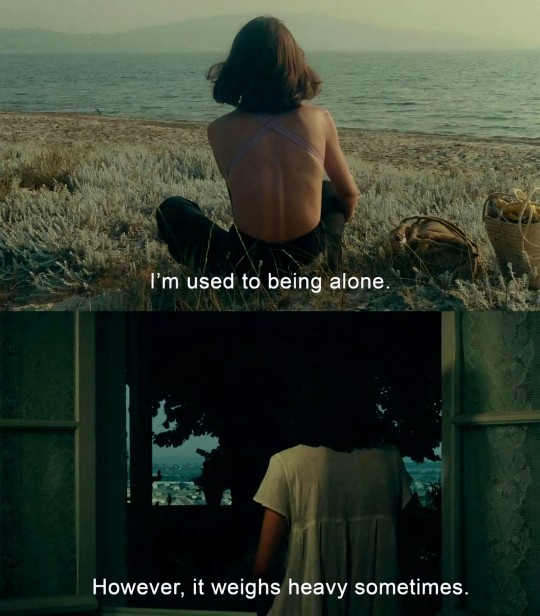
One Sings, the Other doesn't (1977)
#cinephile#cinematography#cinema#movie quotes#movie stills#movies#movie art#movie aesthetic#film and television#film art#film aesthetic#film and tv#film analysis#films#asthetic#sadcore#aesthetics#movie scenes#film stills
4K notes
·
View notes
Text
Learning that fans hated Applejack and called her "boring" is crazyyy to me because I genuinely, unironically believe AJ's the most complex character in the main six.
Backstory-wise, she was born into a family of famers/blue collar workers who helped found the town she lives in. She grew up a habitual liar until she had the bad habit traumatized outta her. She lost both her parents and was orphaned at a young age, having to step up as her baby sister's mother figure. She's the only person in the main gang who's experienced this level of loss and grief (A Royal Problem reveals that AJ dreams about memories of being held by her parents as a baby). She moved to Manhattan to live with her wealthy family members, only to realize she'll never fit in or be accepted, even amongst her own family. The earlier seasons imply she and her family had money problems too (In The Ticket Master, AJ wants to go to the gala to earn money to buy new farm equipment and afford hip surgery for her grandma).
Personality-wise, she's a total people-pleaser/steamroller (with an occasional savior complex) who places her self worth on her independence and usefulness for other people, causing her to become a complete workaholic. In Applebuck Season, AJ stops taking care of herself because of her obsessive responsibilities for others and becomes completely dysfunctional. In Apple Family Reunion, AJ has a tearful breakdown because in she thinks she dishonored her family and tarnished her reputation as a potential leader –– an expectation and anxiety that's directly tied to her deceased parents, as shown in the episode's ending scene. In The Last Roundup, AJ abandons her family and friends out of shame because believes she failed them by not earning 1st place in a rodeo competition. She completely spirals emotionally when she isn't able to fulfill her duties toward others. Her need to be the best manifests in intense pride and competitiveness when others challenge her. And when her pride's broken, she cowers and physically hides herself.
Moreover, it's strongly implied that AJ has a deep-seated anger. The comics explore her ranting outbursts more. EQG also obviously has AJ yelling at and insulting Rarity in a jealous fit just to hurt her feelings (with a line that I could write a whole dissection on). And I'm certain I read in a post somewhere that in a Gameloft event, AJ's negative traits are listed as anger.
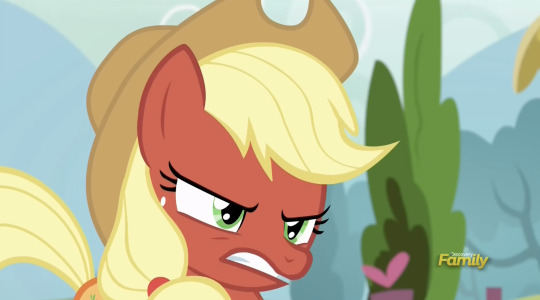
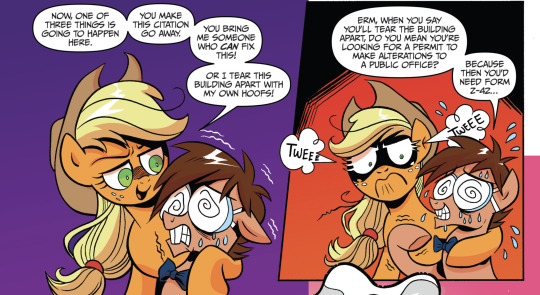
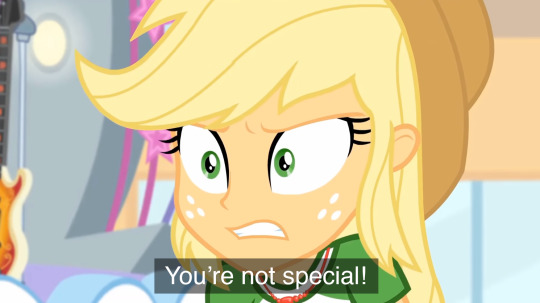
Subtextually, a lot of these flaws and anxieties can be (retroactively) linked to her parents' death, forcing her to grow up too quickly to become the adult/caregiver of the family (especially after her big brother becomes semiverbal). Notice how throughout the series, she's constantly acting as the "mom friend" of the group (despite everything, she manages to be the most emotionally mature of the bunch). Notice how AJ'll switch to a quieter, calmer tone when her friends are panicking and use soothing prompts and questions to talk them through their emotions/problems; something she'd definitely pick up while raising a child. Same with her stoicism and reluctance at crying or releasing emotions (something Pinkie explicitly points out). She also had a childhood relationship with Rara (which, if you were to give a queer reading, could easy be interpreted as her first 'aha' crush), who eventually left her life. (Interestingly enough, AJ also has an angry outburst with Rara for the same exact reasons as with EQG Rarity; jealous, upset that someone else is using and changing her). It's not hard to imagine an AJ with separation anxiety stemming from her mother and childhood friend/crush leaving. I'm also not above reading into AJ's relationship with her little sister (Y'all ever think about how AB never got to know her parents, even though she shares her father's colors and her mother's curly hair?).
AJ's stubbornness is a symptom of growing up too quickly as well. Who else to play with your baby sister when your brother goes nonverbal (not to discount Big Mac's role in raising AB)? Who else to wake up in the middle of the night to care for your crying baby sister when your grandma needs her rest? When you need to be 100% all the time for your family, you tend to become hard-stuck with a sense of moral superiority. You know what's best because you have to be your best because if you're aren't your best, then everything'll inevitably fall apart and it'll be your fault. And if you don't know what's best –– if you've been wrong the whole time –– that means you haven't been your best, which means you've failed the people who rely on you, which means you can't fulfill your role in the family/society, which makes you worthless . We've seen time and time again how this compulsive need to be right for the sake of others becomes self-destructive (Apple Family Reunion, Sound of Silence, all competitions against RD). We've seen in The Last Roundup how, when no longer at her best, AJ would rather remove herself from her community than confront them because she no longer feels of use to them.
But I guess it is kinda weird that AJ has "masculine" traits and isn't interested in men at all. It's totally justified that an aggressively straight, misogynistic male fandom would characterize her as a "boring background character." /s
At the time of writing this, it's 4:46AM.

#mlp#yeah i wrote this last night during insomnia.#yeah i know an embarrassing amount of crap about this kids show#but whatever it's my hyperfixation i'll store as much useless information as i want!!!#i'm gay and neurodivergent i have an excuse#in case you needed more proof that aj's my favorite character#personal#delete later#unless you like this analysis stuff#i get why they didn't reveal aj's parent's death until way later and why they didn't do much with it but i wish they did#cuz narratively there could've been so much material with aj's grief. like. i feel like we gloss over the fact that she lost her#mother and father as a teenager#i tried keeping my personal hcs out of this to keep it unbiased#but i'll put some in the tags#involving rarijack –– i think aj can be (but not always) very self-conscious about her relationship with rarity#anxieties that she's not the right fit or that rarity will move away and leave her some day or that another woman will take her attention#(like in rollercoaster of friendship?? nudge nudge??). basic seperation anxiety stuff#long post#regarding applebloom whenever i think about her and her parents i think about that scene in steven universe where steven looks up at#a portrait of his mother and openly wonders what kind of sack lunches she would've made for him. that episode still fucks me up
7K notes
·
View notes
Text




I think about this dialogue from S1 all the time; to me, it succinctly sums up the differences between Erwin and Levi’s perspectives and motivations.
When it comes to Erwin, it’s much like what Armin said in S1: the people who are capable of making change have to be able to throw everything away and abandon their personal humanity in order to save the greater humanity. Erwin embodies this perfectly—he never hesitated to sacrifice the lives of others on behalf of a greater cause, and even knew how to inspire them into willingly self-sacrificing.
What was that greater cause? For Erwin, it was his dream of finding out the truth and avenging his father—it just so happened that this aligned with what was best for Paradis. If it weren’t for his own personal ambitions, I don’t believe Erwin would have had the same level of commitment or drive.
Erwin knew that all of the deaths of his soldiers and the civilians caught in the crossfire were potentially pointless (and we eventually see that catch up to him right before his death); but at the same time, he knew each death and sacrifice was a necessary step in uncovering the truth.
That’s not to say he saw no value in human life or that he was an evil person—it’s just that he saw more value in the bigger picture and the greater cause, and he didn’t have time to consider his personal humanity in that pursuit. Erwin knew that he needed people like Levi and Hange to stay alive in order to achieve this bigger picture goal since they filled in the gaps of skills he lacked himself.
This also isn’t to say Erwin is purely selfish, nor is he the only one with personal motivations—Eren was motivated by his mother’s death, Mikasa was motivated by protecting Eren, Hange was motivated by learning about Titans. The list goes on.
Levi is uniquely one of the few characters without selfish motivations and dreams (which is ironic since people view him as cold and heartless). Levi had no ulterior motives pushing him to the other side of the war, and nothing personal to gain.
He chose to follow Erwin because of that look Erwin had in his eye—the same look Armin had in his eye—hope for the future, like he could see something no one else could. Levi, simply, didn’t want to make choices he would regret, even though he openly admitted that he never truly knew or understood what the outcome of those choices would be. He believed that following Erwin’s command—and eventually choosing Armin—was the best way to do this.
Levi doesn’t view the lives of his comrades or squad members as disposable. He has a fiercely protective and loyal nature. We see this time and time again—when he adamantly tells a dying soldier that his death wasn’t in vain and that he’d made a difference, how he doesn’t ever truly forgive Annie and Reiner for the lives they took from the Scouts, and his incessant need to avenge Erwin’s death, to name a few.
To me, Erwin and Levi are somewhat of a yin and yang in this way—Erwin was willing to do everything it took to achieve his dream, no matter the sacrifice, and Levi was willing to do everything it took to make sure those sacrifices weren’t made for nothing.
Erwin had to be willing to send people to their pointless deaths; Levi had to make sure those deaths weren’t pointless in the end.
This is a little bit of a half-baked ramble, but I always found this exchange so interesting and telling.
#☆.random thoughts#levi ackerman#erwin smith#attack on titan#aot#shingeki no kyojin#snk#captain levi#commander erwin#levi x erwin#erwin x levi#attack on titan analysis#aot analysis#aot scenes#aot quotes#attack on titan quote#☆.angel.analysis
1K notes
·
View notes
Text
I'm obsessed with the way the background in this frame makes it look as if Aziraphale has wings of fire—on consacrated ground, no less — while he realises he cannot deny his feeling for Crowley any longer.

am I delusional? yes sssir !!!
#azicrow#aziracrow#aziraphale#aziraphale x crowley#good omens#crowley#david tennant#good omens season 2#good omemes#ineffable husbands#good omens season 1#good omens season 3#good omens analysis#ineffable spouses#ineffable idiots#ineffable lovers#ineffable partners#ineffable boyfriends#aziracrow church scene#am i delusional?#yes sir#good omens theories#good omens thoughts#good omens theory#good omens headcanon#good omens fandom#good omens headcanons#good omens fancanon#good omens 1941
1K notes
·
View notes
Text
I’ve only seen it once so forgive me for not saying more—
—but my favorite sequence is by far the part where ROZ is watching Brightbill finally take flight, and she looks up to try and see him as he gets farther away, but then her view of Brightbill is blocked by the pop-up screen saying “Task Complete.”
And she has to rush after him to get her final look, because of that. Because the Task was getting in the way of her seeing him.

#the wild robot#Roz#Fink#fink the fox#lupita nyong'o#chris sanders#pedro pascal#dreamworks#Brightbill#animation#animated movie#2024 movies#analysis#the anatomy of a scene#narrative#storytelling#visual storytelling#storyboarding#character development
2K notes
·
View notes
Text
Buckle up, folks, and prepare yourself for spoilers!
Because we’re going to be analyzing this scene today. And I’m going to explain why Starscream could’ve won.
After D-16’s initial attack, Starscream falls back to recover, and quickly counters with some skilled aerial maneuvers. Here’s a post so you can appreciate it better. Starscream is taking full advantage of his flight ability here. He’s leading the high guard, of course he’s going to be good at flying.
Side note: we don’t know if Starscream is the official leader of the high guard, do we? Maybe he just claimed leadership after they went into exile. It would be fun to think about.
As an extra note: Starscream is using his thrusters to carry both of them, holding D-16 up by the neck.
Extra extra note: D-16 kicks Starscream between the legs.
Now look at this. Here’s when D-16 transforms his foot to kick starscream off.
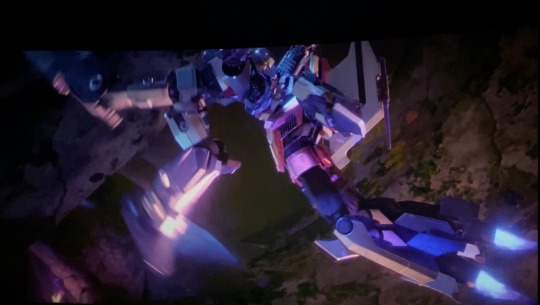
It all happens in a split second, but I tried my best to get screenshots.
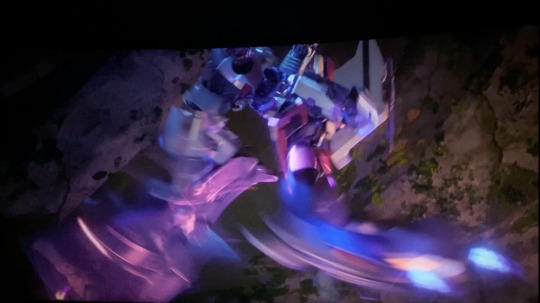
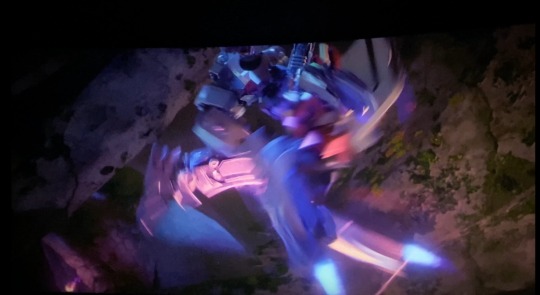
Do you get what I’m trying to show?
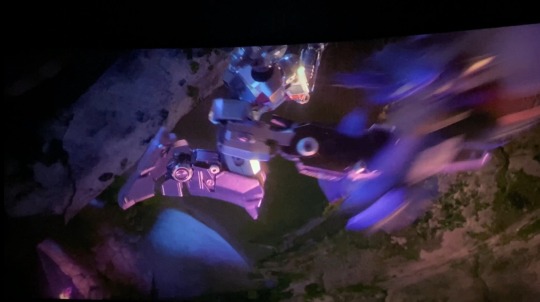
Starscream angles his body forward, with the thrusters still on, before D-16 makes contact with him. He sees the kick coming, and he moves to counter it. When he realises he’s not fast enough to counter, he lets go of right D-16 before the impact in order to make sure he’s flung backwards instead of being injured. If he was still holding on, the damage would’ve been far more severe.
Sure, I find it a little surprising that a guy who can fly would fall in his butt, but I think I can explain it away. The thrusters are turned off when he’s kicked, but they return while he’s flying away. I think that may have been accidental. Maybe he intended to right himself midair and fly away but was unsuccessful, maybe he didn’t mean to activate them.
Either way, it contributes to him landing rougher than he would’ve intended. While I’m here, I want to point out D-16’s little swing off the wall to land next to Starscream. Very graceful.

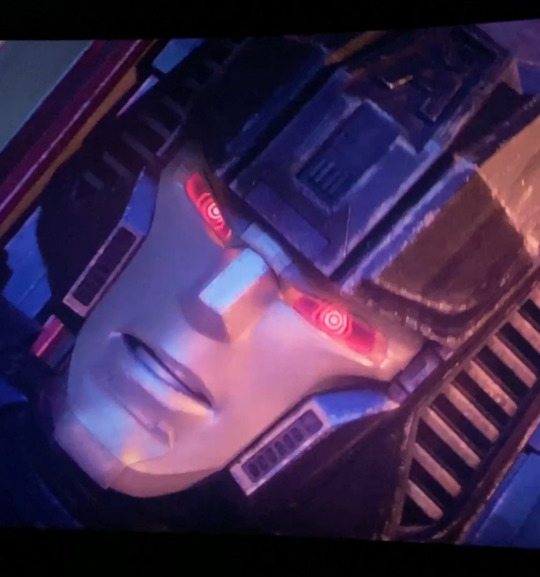
Right before and right after getting punched in the face. There is momentary surprise, but no fear. He doesn’t flinch, he doesn’t take time to recover. One second of scowling, and then “HIT ME!” He doesn’t even need to catch his breath.
Slowing the scene you can see the punches have Starscream’s neck bent at an over 90 degree angle. Not only does he not react to the pain at all, but he also KEEPS ENCOURAGING HIS OPPONENT.
His body language and behavior is confident while he’s being punched. Only when D-16 turns his attention to the crowd does Starscream attempt to free himself.
He’s intentionally antagonizing his opponent, making D-16 drop his guard and focus on giving the crowd a show, he takes the punches like they’re nothing and only tries to break free when D-16 looks away.
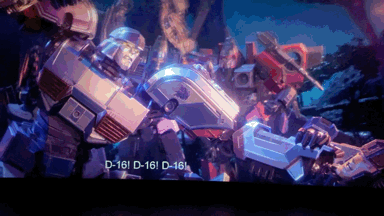
Focus on Starscream’s hands here. D-16 loses his focus, Starscream is very clearly trying to pry him off.
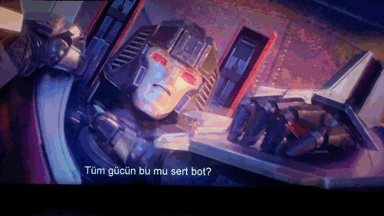
And here, just a few seconds later. First his hand is just… sitting there, not making any attempt to pry off the guy squeezing his throat (presumably very painful) and instead continuing to yell (presumably very painful). And then he Grabs and Pulls Him Closer. This isn’t the body language of a person who’s afraid, Starscream was biding his time and waiting for the opportunity to catch D-16 off guard, use a sudden moment of distraction to his advantage.
We only see fear from him at the very end. Only when he sees the arm cannon which is something nobody expected. Not even D-16 himself. From Starscream’s perspective he was waiting for the perfect moment to strike, to overpower an enemy who is stronger but less skilled and experienced than him, all the while giving the troops a good show. And then the guy pulls out THAT THING to his face.

You can see the moment he knew he fucked up. There’s nothing he can do after that except ask for mercy.
It’s my personal belief that had the battle lasted longer, and had D-16 not discovered his Murder Arm, Starscream would’ve won.
And although I’m not disappointed in this outcome, I would’ve also loved if D-16 had the upper hand physically but still got defeated due to Starscream’s cunning and experience. We would’ve seen Starscream show his talent, and seen that D-16 still has a long way to go.
#transformers#transformers one#tf one#tf one spoilers#transformers one spoilers#tf one starscream#tf one megatron#d-16#starscream#Megatron#scene analysis#the lengths I went to trying to post this you have no idea
2K notes
·
View notes
Text
This is just a smaller observation that will hopefully someday be part of a larger analysis on Kabru's view of Laios & how Laios impacts him...
But I think it really interesting that Kabru surrenders something for Laios twice, and that these moments are inversions of each other.
The first time, Kabru gives up his life to maintain his control. He changes the course of the entire story with this action, and is willing to die to achieve that. Kabru is (supposedly) entrusting the future to Laios, but he is still very much the primary actor in the overall narrative. He is still the one choosing what the story should be.

The second time, however, Kabru gives up his control to keep hold of something personal and selfish (in the way of dungeon meshi selfishness - it is a good thing to keep this desire. It small piece of what makes him a living creature). He steps aside to let Laios choose the way forward. He surrenders narrative agency for personal agency... not changing the story, but changing himself.

#dunmeshi analysis#dungeon meshi#dungeon meshi spoilers#Kabru of Utaya#Laios Touden#of course he DOES shape the story with this action bc this is dungeon meshi and changing yourself changes the story#and choosing to live helps the people around you#far more than giving up your life for the 'greater good'#I love that falling is present in both scenes too#even if it's goofier the second time lol#surrendering/falling/dying/descending into the heart of the dungeon#being consumed... letting someone else being consumed... trusting that the infinte will have an end (you won't fall forever)
2K notes
·
View notes
Text
"If an artist falls in love with you, you can never die."
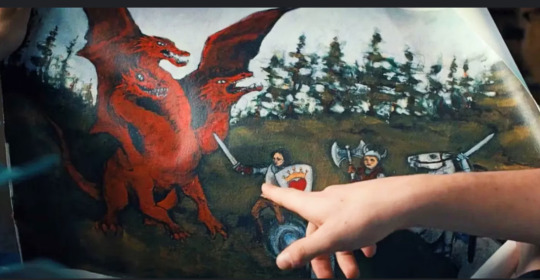
#stranger things#mike wheeler#will byers#byler#mike x will#byler endgame#artists on tumblr#stranger things s5#stranger things season 4#byler thoughts#byler rain scene#byler flirting#byler canon#byler nation#byler tumblr#byler is canon#byler theory#byler fanart#byler fanfic#byler is real#byler analysis#byler brainrot#byler s5#st details#stranger things 5#stranger things theory#mike wheeler is not straight#will byers is in love with mike wheeler#mike wheeler is bi#mike wheeler angst
1K notes
·
View notes
Text



"Mike didn't love El at first sight. He treated her terribly."
"Well, he had just met her/didn't know her yet/was upset about Will!"

The analysis I'm working on is really opening my eyes...
#byler#mike wheeler#will byers#stranger things#stranger things 5#st5#stranger things analysis#anti mileven#Like... I wasn't initially anti-mil#But rewatching and compiling these scenes is really making me head towards there.#El deserves better.
2K notes
·
View notes
Text
natalie screams at her and hits her, and misty lets her. this is fair, she thinks. so she takes it and waits; and when natalie’s done, misty just looks up at her.
she doesn’t threaten nat like crystal. doesn’t beg natalie to keep any secrets for her. instead, she softly asks, “are you gonna tell everyone?”
she knows exactly what’ll happen if nat does, but still she doesn’t plead. there’s no trace of judgement or desperation in her voice…misty’s already accepted this outcome; she just wants to know.
misty is asking natalie if she’s going to die.
she doesn’t ask in desperation or fear, but in despair. despair that she’s betrayed nat; that natalie might hate misty forever and would have every right to…
she asks nat to decide if she gets to live because misty doesn’t think she deserves to. not for this. not for being the reason this place has hurt natalie so irreversibly.
#god the DEVOTION#yellowjackets#mistynat#misty quigley#natalie scatorccio#natalie would never tell the others obviously! but misty didn’t know that at the time.#yellowjackets spoilers#yellowjackets season 3#scene analysis
428 notes
·
View notes
Text
“you never would you coward. (would you…?)”
the master getting teary eyed and scared when he realises the doctor is really considering to pull the trigger but still daring him to do it. He needs to know, he needs to see if the doctor is capable of it. is he? would he really? why is he still pointing the gun at him?
“go on then. do it.”
But he doesn’t want to die. you can hear it in his voice and see it in his face but he needs to know how far the doctor is willing to go. And besides he’s the master. He’s not gonna back down and plead. At least not in this regeneration. the subtle and terrorised headshake after works very well as there’s one part of the script missing in this scene

“don’t.”
and the doctor won’t.
#ahah. im normal.#you need to know this was the scene that made me look for the name of the ship#I already liked thoschei but not at the level to look for fanworks yet this was a gamechanger#I should analyse thoschei scenes more often instead of keeping it all in my head#scene analysis#I guess#does this count as#character analysis#idk#tensimm#thoschei#doctor who#the master#best enemies#simm master#the end of time#doctor/master#me being annoying about the master tag
420 notes
·
View notes
Text

It's crazy how Dungeon Meshi's manga can feel more cinematic and emotional than the anime to me, even when they're practically the same. Compared to the anime, this moment is such a heartbreaking gut-drop. The way Kui uses negative space and flat compositions to create a sense of horrific stillness is so key.
The way the text (Senshi's monologue) is sequestered to an empty corner of a panel or huddled away from the edge of its text box is not only a great way of showing Senshi's headspace (fearful, isolated, dissociating), but creates a visual representation of pause, as if you hold your breathe after each line. The first panel puts us directly in Senshi's perspective too (compared to in the anime, which puts us as an outside observer over Senshi's shoulder). The detail of the door and bricks so effectively implies that he stared at it for so long, waiting and hoping, that its image is burned in his memory. The wood grain, the brick arch, the number of rivets. The lack of dialogue in the second panel shows a moment of realization too –– "he's dead" (also a great example of the Kuleshov effect). And it's that pause that creates a beat and sets a great rhythm to his headspace, like a music rest: "He never came back." (oh god.) "I'm all alone." Finally, the third panel's negative space, cropping Senshi, shows how truly alone he feels. Without his family, the world ceases to exists. Under shock, he traps himself in a 1-foot radius, too scared to even perceive a world outside its boundaries; a world that can hurt him, kill him, make him disappear with it. There is only his body, the stone beneath his feet and against his back, his thoughts, and that awful bowl of soup.
Even though they're a series of flat images, there's an implicit reading of silence in Senshi's realization and horror. Kui influences your experience to slow down and take your time.
Compare this to the anime, which fills every shot with dialogue. The pacing is fast; we never get to sit in silence like we do with the manga. The horizontal frame allowed the boarders to add Senshi, turning the composition into an over-the-shoulder shot, which takes us out of Senshi's POV. They also added a zoom-out in shot one, which adds unnecessary energy to a very somber scene. The tightening on Senshi as a close-up reaction shot also dulls the moment. In the original panel, Senshi stares ahead at the empty space to his left as a shadow surrounds his mind. It not only shows how Senshi's senses are dulling and his world is shrinking (setting up panel three), but shows how terrified Senshi is of what's in front of him, how the air itself becomes pitch black and opaque, how Senshi is surrendering himself to fear. The pacing is understandable and necessary; this episode packed a lot of story content together. It's just a shame because it really (imo) deflated one of the most nauseating moments in Dungeon Meshi.
#dungeon meshi#senshi#analysis#personal#long post#not art#because comics are inherently more abstract and rule-breaky the format thrives off show don't tell#i think trigger is doing a great job overall but they missed the mark on this scene#for me cinematic storytelling will prioritize rhythm; tension; and silence over plot. that's why the manga feels more “cinematic”#if you've been enjoying the anime i cannot recommend also reading the manga enough. it's a completely different experience with much more#subtext and emotion to draw from
4K notes
·
View notes
Text



Penelope and Colin: this is the moment he knows he's going to lose her, really lose her this time, if he doesn't let go the resentment.
#I can't let go the scene#it's possible my fave#i did so much analysis about it#polin#bridgerton s3#bridgerton#bridgerton polin#bridgerton spoilers#eloise x penelope#colin x penelope#penelope bridgerton#penelope featherington#colin bridgerton
2K notes
·
View notes
Text



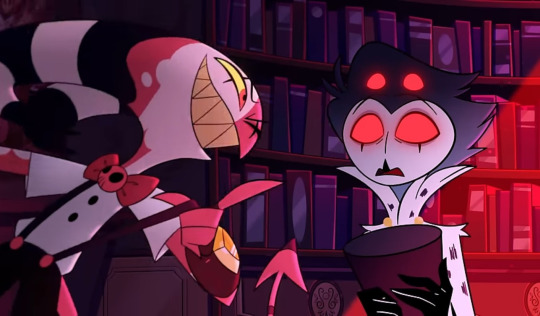




I’m sick to my stomach
#same places different memories#where Stolas fell in love is where it all falls apart#god someone do an analysis on why these scenes parallel for me#this show will be the end of me#the death of me#helluva boss#helluva boss angst#helluva boss spoilers#spoilers#parallels#stolitz#stolitz :(#Stolitz angst#helluva boss the full moon#Stolas#blitzo#hellaverse#helluva blitzo#helluva boss blitz#blitzo x stolas
2K notes
·
View notes
Text



Sooo this is how it went?
#I read qiu-yan's post about the ancestral hall scene. Good points all around. Cool to find out about Chinese culture#but I couldn't stop giggling in the riffraff part. 'in the grand scope of things riffraff is not a good insult he can do better than that'#X'DDD#jiang cheng#wei wuxian#lan wangji#mdzs#meme redraw#lololol I have to show you the image my brain conjured when I read that analysis
629 notes
·
View notes